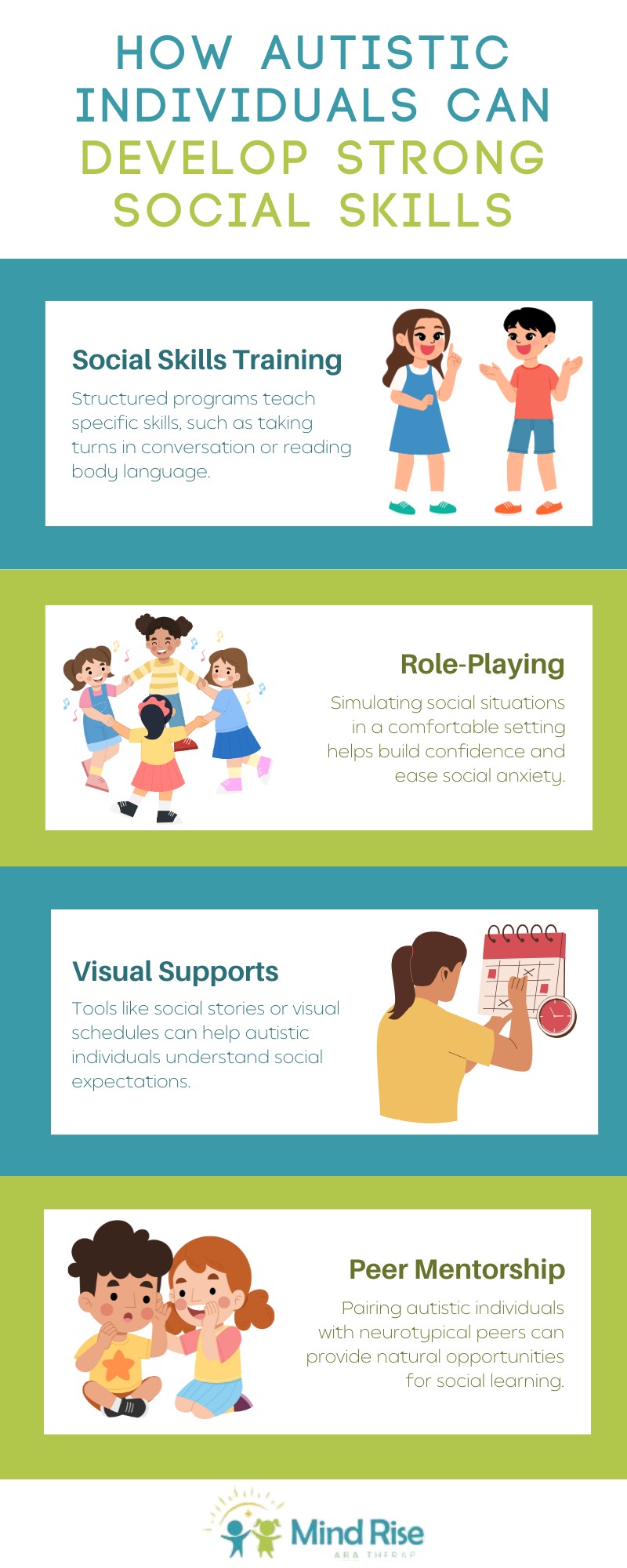Key Points:
- Autism is a spectrum, and social skills vary widely among individuals.
- Many autistic individuals can develop strong social skills with the right support and strategies.
- Applied Behavior Analysis (ABA) therapy is a proven method to help improve social communication and interaction.
- Social success for autistic individuals often depends on understanding, acceptance, and tailored interventions.
Thinking about whether someone with autism can be very social? Autism doesn’t limit social potential—it just means social skills may develop differently. With understanding and targeted support, autistic individuals can shine in social settings and form meaningful connections.

Can Someone with Autism Be Very Social?
Yes, someone with autism can be very social. While social interactions may look different for autistic individuals, many develop strong social skills and form meaningful relationships. The key lies in understanding that autism is a spectrum, and social abilities vary widely. Some autistic individuals may thrive in social settings, while others may need more support to navigate social dynamics.
Autistic individuals often bring unique strengths to social interactions, such as honesty, deep focus on shared interests, and a genuine desire to connect. However, challenges like interpreting nonverbal cues or understanding social norms can make interactions more complex. With the right tools, strategies, and support, many autistic individuals can build fulfilling social lives.
Understanding Autism and Social Skills
Autism is a neurodevelopmental condition that affects how individuals perceive and interact with the world. Social communication challenges are a core feature of autism, but this doesn’t mean autistic individuals lack the desire to connect. In fact, many autistic people are highly motivated to form relationships but may struggle with the “unwritten rules” of social interaction.
For example, an autistic person might find it difficult to interpret facial expressions, tone of voice, or sarcasm. They may also feel overwhelmed in noisy or crowded environments, which can make socializing more challenging. However, these challenges don’t define their potential for social success.
Factors That Influence Social Skills in Autism
Several factors contribute to how social an autistic individual can be. Understanding these can help parents, caregivers, and educators provide better support:
- Individual Differences: Autism is a spectrum, meaning no two individuals are the same. Some may naturally excel in social settings, while others may need more guidance.
- Environment: A supportive and understanding environment can make a significant difference. Schools, workplaces, and social groups that embrace neurodiversity foster better social outcomes.
- Interventions: Evidence-based therapies, such as ABA therapy, can help autistic individuals develop social skills and confidence.
How Autistic Individuals Can Develop Strong Social Skills
Social skills are not innate; they are learned. For autistic individuals, this learning process may require tailored approaches. Here are some strategies that can help:

The Role of ABA Therapy in Building Social Skills
Applied Behavior Analysis (ABA) therapy is one of the most effective interventions for improving social skills in autistic individuals. ABA focuses on breaking down social behaviors into manageable steps and reinforcing positive interactions.
For example, an ABA therapist might work with a child to practice greeting others or maintaining eye contact. Over time, these small steps build into more complex social skills. ABA therapy is highly individualized, ensuring that each person’s unique needs and strengths are addressed.
Common Misconceptions About Autism and Socializing
There are many myths about autism and social skills that can create barriers to understanding and acceptance. Let’s debunk a few:
- Myth: Autistic individuals don’t want to socialize.
Fact: Many autistic people desire social connections but may struggle with the mechanics of interaction. - Myth: Autistic individuals can’t make friends.
Fact: With the right support, autistic individuals can form deep and lasting friendships. - Myth: Social skills in autism are fixed and can’t improve.
Fact: Social skills can develop over time with practice, therapy, and support.
How Parents Can Support Social Development
Parents play a crucial role in helping their autistic children build social skills. Here are some actionable tips:
- Encourage Playdates: Structured playdates with peers can provide valuable social practice.
- Model Social Behavior: Demonstrate appropriate social interactions and explain them step-by-step.
- Celebrate Small Wins: Acknowledge and reward efforts, even if the outcome isn’t perfect.
- Collaborate with Professionals: Work with therapists, teachers, and counselors to create a consistent support system.
The Importance of Acceptance and Inclusion
Social success for autistic individuals isn’t just about teaching skills; it’s also about creating inclusive environments. Schools, workplaces, and communities that embrace neurodiversity allow autistic individuals to thrive socially.
For example, sensory-friendly events or quiet spaces can make socializing more accessible. Similarly, educating peers about autism fosters empathy and reduces stigma. When society meets autistic individuals halfway, the potential for social connection grows exponentially.
Unlock Your Child’s Social Potential with Mind Rise ABA
If you’re wondering, “Can someone with autism be very social?” the answer is a resounding yes—and Mind Rise ABA is here to help. As a leading provider of ABA therapy in Virginia, we offer personalized, evidence-based programs designed to support your child’s development. Our therapy focuses on strengthening social skills, enhancing communication, and boosting confidence—empowering your child to thrive at home, in school, and beyond.
Ready to take the next step? Contact Mind Rise ABA today to learn more about our programs and how we can support your family’s journey. Let’s work together to unlock your child’s full social potential.

